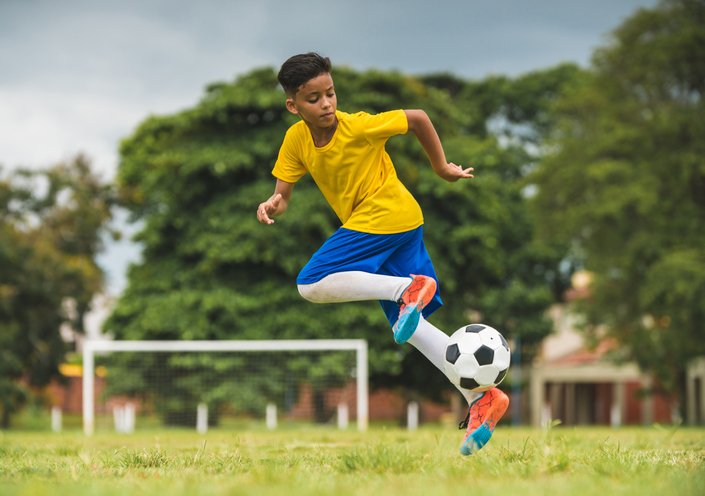
<!DOCTYPE html PUBLIC "-//W3C//DTD HTML 4.0 Transitional//EN" "http://www.w3.org/TR/REC-html40/loose.dtd“>
By Children’s Health | Contributor
Outdoor workouts, training drills, and even casual activities can affect athletes in the intense summer heat of Texas. Due to the precautions related to COVID-19, athletes engaging in outdoor sports this summer are likely at an increased risk for dehydration and heat-related illnesses compared to previous years.
“Most people have been less active, training at a lower intensity, and are not acclimated to the extreme heat,” explained Brittany Wehrle, Performance Dietitian at the Children’s Health Andrews Institute for Orthopaedics & Sports Medicine in Plano. “As a result, everyone has a higher chance of becoming dehydrated or experiencing heat illness during outdoor practice, running, or training.”
Wehrle pointed out that athletes taking certain medications or participating in sports that require heavy gear may face an even greater risk of heat-related issues.
Wehrle and the specialists at the Children’s Health Andrews Institute recommend following these guidelines to minimize the risks of dehydration and heat-related illness.
Establish a Hydration Strategy
“It’s essential to distribute your fluid intake throughout the day rather than only drinking while training,” said Wehrle.
“While it’s not an exact science, the target should be to drink half your body weight in ounces daily,” she continued. “It’s crucial to arrive at practice or a workout well-hydrated, as it can be even more important than hydrating during the activity itself.”
Wehrle also suggests consuming electrolyte-rich snacks before training, such as salted watermelon or cucumbers, pretzels with juice or water, or a light, well-balanced meal with fruits or veggies. Additionally, she recommends hydrating with electrolytes during training and bringing a frozen water bottle, which can provide cold water and double as an ice pack to help cool down the body.
Recognize the Symptoms of Heat Illness
The terms “heat exhaustion,” “heat stroke,” and “heat illness” are often heard in Texas, especially during the summer. What sets them apart?
“Heat exhaustion is the earlier, less severe stage of heat-related illness,” explained Wehrle. “Common symptoms of heat exhaustion can include dizziness and fatigue, excessive sweating, clammy skin, a weak or slow pulse, and muscle cramps. In contrast, heat stroke may involve a severe headache, halted sweating, a body temperature of 103 degrees or higher, a rapid and strong pulse, potential unconsciousness, and even seizures.”
Speak Up
If athletes begin to show signs of heat exhaustion, Wehrle stresses the importance of immediately notifying a coach or athletic trainer. She also recommends moving to a shaded or air-conditioned area, using a cold towel to bring down body temperature, and hydrating with a sports drink.
Wehrle emphasizes that it’s essential to voice concerns and ask questions in any situation.
“No two athletes are the same,” Wehrle remarked. “If an athlete ever has a question or concern, it’s vital to discuss it with a parent, coach, athletic trainer, or sports medicine professional. Preventative measures can greatly reduce the risk of heat-related issues and other injuries.”
For athletes who frequently experience cramps or have faced heat illness previously, Wehrle advises measuring their sweat rate. This can be done by weighing oneself before and after workouts, a method currently being used by the team at the Children’s Health Andrews Institute for its athletes.
Editor’s Note: For more information about the complete range of care available at the Children’s Health Andrews Institute, visit Childrens.com/Andrews.
ABOUT BRITTANY WEHRLE:
Brittany Wehrle works as the Performance Dietitian at Children’s Health Andrews Institute Sports Performance powered by EXOS. Before joining the Children’s Health EXOS team, she served as a sports dietitian at Texas Christian University and the University of Georgia.
Brittany holds a Bachelor’s degree from Rice University and completed her dietetic internship at Yale-New Haven Hospital. She earned her Master of Science in Kinesiology from Texas Christian University and is a professional member of the Collegiate & Professional Sports Dietitian Association (CPSDA).






